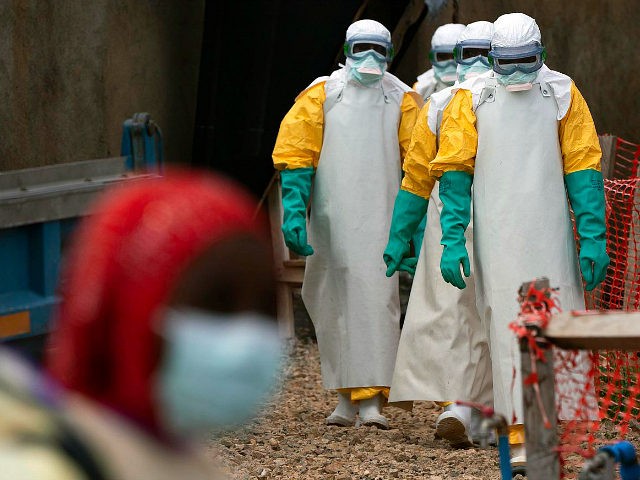Locals in Beni, Democratic Republic of Congo (DRC), estimate that 5,000 people participated in a protest Thursday against mass killings by local militias seeking to cement control over natural resources in attacks significantly hindering international aid groups’ efforts to combat the Ebola virus.
Beni is a city in North Kivu province in the heart of the area affected by the ongoing Ebola outbreak in DRC. North Kivu and the province to its north, Ituri, have suffered decades of attacks from armed groups fighting for territory. Many in these groups refuse to believe the Ebola virus is real and fear that health workers are deliberately killing people taken in for Ebola treatment, resulting in deadly attacks on medical professionals.
The World Health Organization (WHO) declared the Ebola outbreak a Public Health Emergency of International Concern last month.
“Young people in Beni city decided to demonstrate. They threw stones on the avenues, burned tires in some neighbourhoods and called on the population to stop all work,” Kizito Bin Hangi, identified as a “civil society official,” told Radio France Internationale. “Really, it’s not right, there are killings every day.”
The Congolese outlet Actualité similarly reported protesters organizing roadblocks in protest and burning tires in response to killings by armed militias — particularly the killing of at least seven in Mbau, a town near the outskirts of Beni. Police reportedly reopened the roads quickly, but the turmoil nonetheless forced shops to close, presumably for fear of having their goods damaged or stolen in the chaos.
Actualité reports that locals had organized a smaller protest the day before, and another group marched to a United Nations mission office to demand an intervention to restore peace.
The number of deaths in the Mbau attack varies depending on the news source, given Beni’s remote location. While most publications estimate seven people were killed, the Chinese state media outlet Xinhua, citing local sources, put that number at nine people, reporting they were beheaded and another five were kidnapped and taken into the dense forests nearby.
Xinhua reports that the Mbau attack followed another four attacks that left at least 20 dead.
Most reports blame the attacks on the “Allied Democratic Forces” (ADF), a particularly violent militia that often targets civilians in its quest for control of local resources. Police have not identified any individuals responsible for the killings.
In response to the protests, President Felix Tshisekedi issued an order to the nation’s military to “put an end to this state of affairs.”
The president “listened to information from the [military’s] Chief of General Staff,” Interim Minister of Defense Michel Bongongo told reporters, according to local reports. “There, he said the situation in Beni is unacceptable. Thus, he gave firm instructions to put an end to this state of affairs.”
Bongongo did not offer specifics on the military activity Tshisekedi approved.
Containing Ebola in the middle of ongoing guerrilla warfare has proven a daunting task for health workers. The fighting is forcing hundreds of refugees to risk crossing the central African Great Lakes into Uganda, making contract tracing and containment of potential patients difficult. Local aid groups warned in July that refugee flows had doubled in the past month at Lake Albert, which connects Ituri province to Uganda, in just the past month.
“There are so many soldiers, yet the enemy rebel groups are in the surrounding forests. If they find a person in the garden, they kill you. They completely finish you,” a refugee told Voice of America in a report published in July.
The result of the terror these groups impose on civilians is that many are barely aware an Ebola outbreak is occurring, DRC’s Radio Okapi reported last week.
“A year after the epidemic began … the entire population, particularly those in the north, have not yet been made aware of the existence of the disease,” Omar Kavota, the head of the local anti-Ebola response committee for Beni and neighboring Lubero told the outlet. The committee has met “resistance” in community pockets that do not yet believe the Ebola outbreak is real, he added.
President Tshisekedi has repeatedly urged people to abide by standards set by health workers in their communities, insisting in April that Ebola is “not an imaginary disease” and “we follow the instructions, in two or three months Ebola will be finished.”
A major problem with the Ebola response currently, however, is that many affected communities do not have healthcare infrastructure built up there and fear outsider response teams. The month Tshisekedi made that speech, for example, militia fighters killed a Cameroonian doctor operating in Butembo, North Kivu, on behalf of the WHO. Authorities arrested three Butembo doctors in response to the killing of virologist Dr. Richard Valery Mouzoko Kiboung this week, prompting yet another disturbance: the threat of a medical worker strike in solidarity with the doctors, who peers say had nothing to do with the militia attack.
Ebola has since spread out of deep North Kivu to Goma, a city of one million in the southeasternmost tip of the province, on the border with Rwanda. WHO Director-General Dr. Tedros Adhanom Ghebreyesus called the virus’s arrival in Goma last month a “game-changer” and declared an international emergency, stating, “It is time for the world to take notice and redouble our efforts. We need to work together in solidarity with the DRC to end this outbreak and build a better health system.”
As of August 7 — the latest numbers the WHO has available — doctors following the current outbreak have documented 2,787 cases of Ebola virus disease and 1,868 deaths. All but three were diagnosed in DRC; the other three were identified in Uganda, relatives of an Ebola victim who had traveled across the border for a funeral.

COMMENTS
Please let us know if you're having issues with commenting.